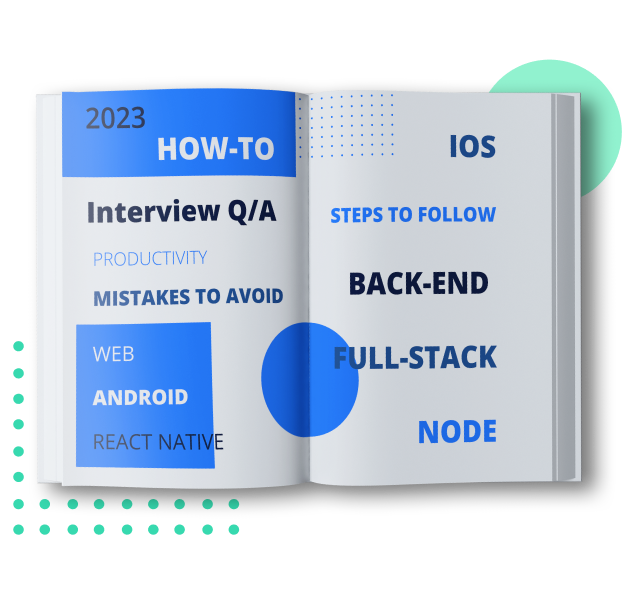A mobile developer is a specialist who creates applications for different mobile devices: smartphones, tablets, smartwatches, etc.
As per Statista, data revenue from mobile applications will comprise over $522 billion in 2024. The statistical data speaks not only in favor of the popularity of mobile apps but also the ones who create them.
It can prove incredibly costly to hire the wrong mobile application developer, whereas hiring the right candidate can make a world of difference for your organization. This review discusses job interview questions you should add when interviewing a mobile application developer.
General Mobile Application Developer Interview Questions
General applications developer interview questions about mobile application development allow you to learn more about the skills and knowledge each candidate possesses. Below is a list of mobile development interview questions to ask an app developer that we recommend you start with during job interviews.
1. How many mobile apps have you developed?
This simple and easy question is a way to break the ice during the interview and establish the developer’s level of experience. Mobile app development is a complex process, and engineers usually improve with experience. Therefore, first and foremost, you want to hire an experienced mobile application developer. The ideal candidate should have experience with multiple projects that are similar to yours.
2. Based on our project needs, what development program do you recommend?
Certain mobile app development platforms may work better than others, depending on the specifics of your application. However, the ideal answer to this interview question focuses on cross-platform development. The developer should, at the least, have the willingness to pursue cross-platform development if they do not already have experience.
3. Do you have a GitHub repository or portfolio available for review?
A GitHub repository contains all of a developer’s project files and shows revision history. This free resource helps employers view the quality of an applicant’s work quickly. If they do not have a GitHub repository, then they should at the least be able to provide a link to their portfolio that is stored elsewhere. The lack of an organized portfolio or repository should be regarded as a hiring red flag as it makes it harder to collect samples of their work.
4. What methods do you use to stay current in the field?
Due to its youth in nature, mobile development is a constantly evolving field. There are technological advancements regularly, and the best practices are constantly changing. Subsequently, the ideal hire is one who actively learns new methods, practices, and technology. If they do stay up to date, then answering this question should be easy for them. For example, this may involve listening to lectures, reading programming updates, etc.
5. Do you work on projects outside of work? What projects interest you the most outside of work?
This application developer interview question is interesting as it gives insight into where their passion lies. Ideally, you want this to be a genuine answer that aligns with the type of program you need. You can also follow up by asking about projects they enjoyed the most in the past. This may seem less relevant, but determining where their passion lies can be incredibly telling as to whether or not they are the ideal fit for your organizational needs.
6. What research resources do you use when facing challenges during development?
The ideal candidate realizes where their limitations lie and has a process for finding solutions for them (via support, research, and learning). Developers should have go-to resources to help them overcome anticipated challenges while developing applications. This reveals how well they will be able to solve problems if and when they hit roadblocks. Otherwise, you run the risk of hiring a developer who is not capable of solving challenges fast and effectively, leading to major bugs (coding errors) and incomplete work.
7. What is your approach to balancing the development of the application and the specific needs of the client?
There are essential two separate (albeit similar) goals for mobile application developers. The first is to develop effective and efficient application software. The second is to meet the needs and demands of project stakeholders and end-users. When conflicts develop between the developer’s programming plans and the client’s needs, the developer should ideally be able to balance both goals and find the appropriate solution.
8. Are you able to develop the specific features we need?
You can learn more about which candidates are the right fit for your organization with this question. The right candidate should have experience designing the features you need for your mobile application. If they do not have direct experience, then they should demonstrate and explain a process that allows them to adequately learn on the fly and ensure quality while meeting critical project deadlines.
9. Tell me about a recent mobile application project you have completed. What was your process for developing the application?
This question is designed to gain more insight into the application developer’s experience and work process. They should lead you through their work process (step-by-step), outline how they typically handle complications during the development stages, and detail their experience working with others throughout mobile app development projects.
10. How do you remain current in the technology field?
This can be used as a follow-up to question four (see above). However, whereas question four should deal more with mobile application development innovations, this application development interview question is broader and should involve a more comprehensive answer about their efforts to stay current with IT overall.
11. What skills are most important for successful application development?
You want to ensure the mobile application developer that you hire values the same skills as your organization. This ensures that they are the right organizational fit for the open position. Of course, as an interviewer, you should also review their resume (especially if there is a “skills” section) to gain more insight.
Operational Mobile Application Developer Interview Questions
These application engineer interview questions offer a way to learn more about each candidate’s work process and operations. The app developer interview questions below should provide insights into their ability to communicate with other team members, the resources they use during the development stages, testing and verification processes, and more.
12. Do you have experience working with application development teams (either onshore or offshore)? If so, how was your experience?
Of course, this question is only relevant if you intend to utilize a comprehensive team or are considering it. Mobile application developers with experience working with development project teams can help you understand some of the possible challenges you may face along the way and how they have resolved the issues in the past. This also helps determine their ability to work with others.
13. How do you migrate an application across operating systems?
You want to ensure your mobile application is functional across all platforms and operating systems; this is also known as adaptive programming. The ideal candidate ensures the functionality is the same, regardless of the hardware platform or operating system. This increases the accessibility to the application and allows for an improved user experience.
14. What development methodology do you employ when developing mobile applications?
This question is designed to learn more about the method candidates use when they are creating mobile applications. Agile development enables teams to develop projects faster and with more predictability. Ideally, you want the candidate you choose to understand agile practices and implement them into their work processes.
15. Would you recommend cross-platform development? Why or why not?
Cross-platform development is the creation of an application that is compatible with multiple platforms. There are obvious benefits of cross-platform development, such as a broader reach and ease of access for your consumers. It also makes it easier to use with both an iOS device and an Android device. However, there may be some drawbacks to consider, such as a more complex code design and longer wait times for new features. The ideal candidate can explain their recommendation and why they feel you should (or should not) go with cross-platform development.
16. How do you describe complex issues to stakeholders (who may not understand technical language) during application development?
Mobile application development is a large project for organizations. Part of the developer’s job duties is often to communicate with other non-technical team members and stakeholders. The ideal candidate should demonstrate the ability to communicate technical language effectively, so the organization can remain up-to-date on the project’s progress and plan their services and plans accordingly.
17. What actions do you implement to help prevent a crash?
A mobile application that crashes can lead to costly repair and time when your app is out of service. Subsequently, you want to hire a developer who can do everything possible to prevent it from crashing. The candidates should explain the process and steps they use when developing, inspecting, and verifying the application before it is released to mitigate the risk of a disastrous crash that proves costly to repair.
18. What security measures do you implement during the development process?
Developers should understand and implement best practices for protecting the application. This is especially the case for internal applications that may contain confidential information relevant to the organization. The ideal candidate has a process that minimizes the risk of a data breach and other types of security concerns.
19. Can you explain the application project in layman’s terms?
This question is particularly useful if you do not have advanced knowledge of internet technology terminology and procedures. More importantly, this tests the candidate’s communication skills, especially as it relates to communication with shareholders and others who are overseeing the organizational process (see question 16).
20. What is your process for load testing?
A load test places pressure on the application to see how it responds. This is a critical part of the mobile app testing process once the application is developed. It tests the application during normal conditions as well as at its breaking point. You can learn a lot about each candidate’s work process by how they answer this mobile app testing question.
Technical Mobile Application Developer Interview Questions
The technical part of the interview is designed to learn more about each developer’s in-depth knowledge of programming interfaces, integrations, programming languages, quality testing, and more. Below are technical questions to ask app developers.
21. Can you describe the key differences between a mobile application and a web application?
This could be used as a follow-up question to the aforementioned app interview questions related to cross-platform development (which allows for optimal functionality with a mobile screen and larger screens. By asking an additional question about this form of development, you are emphasizing its importance. You can also use this question to ensure the candidate’s answers are consistent.
22. What APIs have you used in the past?
An application programming interface (API) is (in simplest terms) a type of software interface that allows for functional communication between two or more operating systems. Mobile application developers should be incredibly familiar with APIs and the different types. They should be able to explain their experience and even provide a recommendation as to which one would be best for your project needs.
23. What is your process for adding integrations such as Google Analytics?
This should be a fairly simple process for mobile application developers. Ideally, you want this not to take up a significant passage of time, especially if you are paying hourly. However, this process is integral and should not be rushed or overlooked. Ideally, the candidate has experience adding integrations successfully and promptly.
24. Are you able to make my application multilingual?
Much like adding certain key integrations, making the mobile application multilingual should be a relatively simple process. However, some developers may not have an established process for doing so, in which case they should demonstrate a willingness and ability to learn. This is particularly necessary if you have customer segments with different languages.
25. Do you have experience with React Native? If so, what are the benefits?
React Native is an open-source UI software that is popularly used to develop mobile applications. Many skilled mobile application developers prefer React Native technology, and your company may prefer it as well. This question sheds light on their experience with React Native and serves as an opportunity to learn more about its benefits.
26. What are the differences between verification and validation?
This asks each candidate to define the terms verification and validation and explain how they differ. The purpose of this question is to ensure they are familiar with all of the subtleties that are involved with mobile app development and able to explain them to someone who may be less familiar. You can also ask them to provide an example as well.
27. What are the differences between Quality Assurance and Quality Control?
Similar to the previous question, this is also asking for definitions of technical terms related to the development process. A well-explained answer here further shows they understand the software development process. This also shows that they can measure quality properly throughout the project. The ideal candidate can explain both of these quality testing processes and how they differ when answering this mobile testing question.
28. What is your process for front-end development? What challenges could you face?
The front end of an application, or the client side of an application, is the user interface that users interact with. This includes the overall design of the application. Many developers are incredibly skilled with back-end development, but they may not be as well-crafted with front-end aspects of the mobile application’s design. The ideal candidate understands where their weak areas are and the challenges they could face with front-end development.
29. What is your experience with native language C or C++ data types in JAVA?
If your organization intends to use this form of programming language, then this is an essential question to ask. The answer shows the developer’s knowledge, experience, and skill set related to native C and C++. You may also want to consider follow-up questions if this is particularly important for your organization and the project for which you are interviewing.
30. What are some of the different input types with HTML5?
Most qualified mobile application developers have experience with HTML5 and its source code at this point. If they do, then answering this question should be easy. This is also more of a specific question about HTML that is hard to answer without comprehensive knowledge. If the developer does not have an in-depth understanding, then they should be honest and show a willingness to learn (assuming it is applicable to the job description).
31. Can you describe the importance of user interface during mobile application development?
The user interface (UI) is one of the most critical aspects of your application; a well-designed UI makes the application more functional and easy for consumers. Developers should not only understand how to properly design the UI, but they should also understand its importance and the commercial and business benefits of proper design. For instance, they may describe why consumers will find it interesting both in the mobile app store and after download.
32. What programming languages do you have experience with?
Programming languages (i.e., JavaScript, Swift) are notation languages that are used to develop mobile applications. Ideally, candidates should show a comprehensive knowledge of one or more programming languages. Ideally, they should be familiar with your organization’s preferred programming language. If their experience does not match up with your plans, then ask the candidate why they might recommend a different language for the project.
33. How do applications and system software interact?
This question provides more insight into each candidate’s knowledge of how applications interact with other aspects of your IT infrastructure. The development of mobile applications is, of course, the primary job duty. However, applications usually are just one of many IT infrastructure components (albeit a major component). Subsequently, the developer needs to have a working knowledge of the larger picture as it pertains to your system software.
Find the Right Mobile App Developer with JayDevs
JayDevs lets you hire dedicated developers for your mobile applications. Our developers are experienced and work diligently to help you meet your project goals. Along with providing you with the CVs of qualified candidates, we also help you arrange job interviews and interview questions for mobile app developers. To learn more and get started, contact us today.




















